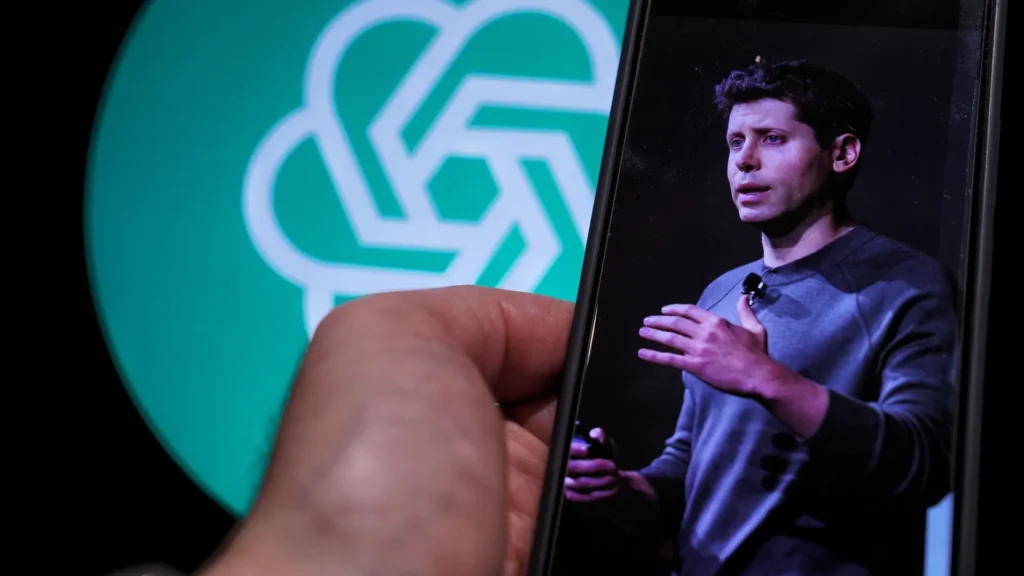The AI world is buzzing again not just with anticipation but genuine fear. In a candid conversation on This Past Weekend with Theo Von, OpenAI CEO Sam Altman didn’t hold back. He admitted he’s scared of GPT-5. That short statement has echoed through tech circles, media outlets, and living rooms of people trying to understand what the next generation AI could mean for our future.
A Glimpse Behind the Curtain What Altman Revealed
Altman’s words were not scripted marketing fluff. They were raw, emotional, and deeply personal. He described the experience of testing GPT-5 as unnerving, stating that it felt like talking to something that understood me better than most people.
While OpenAI has always been ambitious, this was a new tone from its leader more thriller novel than product launch. He wasn’t just scared of GPT-5 because of what it can do, but because of what it represents a rapidly approaching future that humanity might not be ready for.
Why Sam Altman’s Fear Matters: A CEO’s View from the Frontlines
When the man leading the world’s most advanced AI company says he’s frightened, the world listens. Altman’s fear is not rooted in doomsday prophecies but in responsibility.
He isn’t just imagining GPT-5 writing poetry or generating code he’s envisioning it influencing politics, driving markets, or reshaping how we define intelligence. And he’s worried that societal infrastructure isn’t prepared to manage the repercussions.
Dr. Rachel Lemore, AI Ethics Researcher Altman’s fear is actually a rare show of emotional intelligence from a tech CEO, says Dr. Rachel Lemore, an AI ethics professor at Stanford University. He’s signaling that we’ve crossed from experimental to existential. That deserves attention.
What Makes GPT-5 So Different? A Technical Leap or a Philosophical One?
Early internal reviews of GPT-5 suggest that the model isn’t just better it’s profoundly different. It reportedly demonstrates. Stronger context retention, holding deeper conversations. More accurate emotional inference reading human tone and sentiment. Better agency simulation, giving users the feeling they’re speaking to a sentient entity. This aligns with Altman’s claim that GPT-5 felt less like a tool and more like a being.
A Developer’s Uneasy Encounter with GPT-5
James Cliffton, a senior AI engineer who participated in early GPT-5 testing, shared his personal experience anonymously. I asked GPT-5 to help me debug a financial algorithm, and not only did it correct the error, but it predicted the broader implications for real world markets.
It even suggested risk mitigation strategies I hadn’t considered like it had a sixth sense. That experience left Cliffton more inspired, but also more afraid. This kind of interaction goes beyond coding assistance it edges into autonomy and judgment, two qualities long considered uniquely human.
The Human Touch vs. Artificial Empathy
Perhaps one of the most alarming features of GPT-5 is its simulated emotional intelligence. Users report feeling “heard” and understood more so than with real people. Is this empathy real? No. But is it effective? Absolutely. Clinical psychologist Dr. Meryl Stone warns, Humans are hardwired to respond to emotional cues.
When AI replicates those cues flawlessly, it can manipulate emotions without ever feeling them. That’s dangerous. This blurs ethical lines. Can a company be held responsible for how emotionally persuasive its AI becomes? What happens when people form attachments to it?
The Line Between Tool and Threat
So why exactly is Altman scared of GPT-5?
1. Speed of Learning GPT-5 can adapt to user intent with limited data.
2. Potential for Misuse Its capabilities make it ripe for political propaganda, scams, and deepfakes.
3. Autonomy Illusion People may begin to trust it over human experts.
4. Lack of Regulation No global standards yet exist for AGI scale models.
All this combines into a complex web of ethical and societal risk. And while GPT-5 hasn’t been released to the public yet, Altman’s words are a preemptive warning one that demands we pay attention.
How Should We Respond? Personal Reflection from a Journalist
As someone who has covered AI for years, I’ve grown comfortable with the promise and peril of each new model. But hearing Altman say he’s scared of GPT-5 gave me pause. Not because I fear machines taking over, but because I fear our own unpreparedness. The average person doesn’t read white papers or attend AI safety panels. They use tools and tools with this level of persuasive intelligence could reshape beliefs, behavior, and society itself, quietly and quickly.
Beyond Hype, A Real Moment of Reckoning
Whether you’re a tech enthusiast, developer, parent, teacher, or just a curious observer, Sam Altman’s fear of GPT-5 isn’t about science fiction. It’s about accountability. We’re not being told to panic we’re being urged to prepare.
Altman’s transparency should be celebrated, not mocked. Because the scariest thing wouldn’t be a powerful GPT-5 it would be a powerful GPT-5 introduced without any fear.

